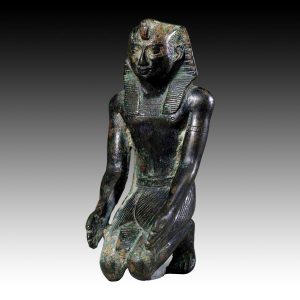The famous 5th ruler of the Twenty-sixth Dynasty, Apries was the Greek name commonly referred to Wahibre Haaibre, a pharaoh of Egypt. The birth name of this king was Wah-ib-re, meaning “Constant is the Heart of Re” and who’s Throne name was Haa-ib-re, that meant “Jubilant is the Heart of Re Forever”. Ancient Egypt Apries succeeded his father, Psamtik II in February of 589 BC., of Egypt’s 26th Dynasty.

Apries conquered Sidon of Phoenicia and it was this one military victory when he conquered Apres used Greek mercenaries for his military campaigns and this soon caused discontent in the national army, particularly in the Libyan soldiers, that were offended and organized revolts in Nubia.
The discontent grew, when a Greek army slaughtered some Egyptian soldiers that Apries had sent to help the Libyans in Cyrene.
Apries failed to help his ally King Zedekiah of Judah against the invading armies of Nebuchadrezzar II of Babylon, but after the fall of Jerusalem he received many Jewish refugees into Egypt
Apries’ main achievements were on the international level, as he played a central part in the fall of Judah to Babylonia. King Zedekiah of Judah was his ally, but he did not intervene to help when Judah was attacked.
Army of Ancient Egypt Apries
When Apries launched an attack against Cyrene he was heavily defeated and his subjects held him responsible for the loss of so many Egyptian lives. To his dismay, the returning army and the friends and family of those who had died rose up against him. He sent Amasis (Ahmose II Khenemibre) to calm them down, but instead, they crowned Amasis Pharaoh and marched with him against Apries.
He continued a foreign policy of his father of intervention in Palestinian affairs, but was plagued with a number of military problems at home and abroad.
He addressed himself vigorously to a Chaldaean problem that had plagued his predecessors, initially operating on a large scale basis against them in conjunction with the Phoenician cities and Zedekiah of Judah. However, this ended up being a disaster and possibly caused an invasion of Egypt in the late 580s BC.